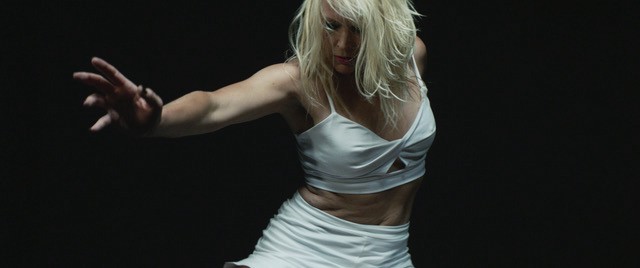A Swedish native, Isabella Eklöf has directed 11 short films, several of which have been screened on the international film festival circuit. In 2012 she received Bisballeprisen, a prestigious Danish art prize, for her graduation film “Notes From Underground.” “Holiday” marks her feature directorial debut.
“Holiday” will premiere at the 2018 Sundance Film Festival on January 21.
W&H: Describe the film for us in your own words.
IE: “Holiday” is a slapstick tragedy about the heartbreaking ruthlessness of commercialism told through a woman’s introduction into life as a gangster’s girlfriend and maybe wife — if she proves to be good enough, that is.
It’s a world where everything and everyone is a piece of candy for sale but only if they are colorful and easy, where nothing lasts for very long, and everything and nothing is at arm’s reach.
W&H: What drew you to this story?
IE: The gangster world is — for good reason — closed off and secret, and it was a joy to explore it through my co-writer, Johanne Algren, who knows it firsthand.
The female perspective was interesting to me, letting me draw parallels to both my upbringing with stoic and old fashioned Swedish values, and relationships I’ve had with rich and/or controlling men.
W&H: What do you want people to think about when they are leaving the theater?
IE: I don’t believe that’s any of my business.
W&H: What was the biggest challenge in making the film?
IE: Getting the script right. Working with a decidedly anti-dramatic tension as a guiding principle is, for obvious reasons, a difficult art. Any false note may topple the whole construction.
We worked for four years with the script, albeit not full time, and I’m not sure it could have been done quicker. It takes time to unravel the essence of things; it has to rest and mature — as do the artists.
W&H: How did you get your film funded? Share some insights into how you got the film made.
IE: The film is made through film funds (Denmark, Holland, Eurimages and West Sweden). Finding the local and/or well connected co-producers that could convince the various funds to look seriously at our project was essential in getting the film funded.
W&H: What does it mean for you to have your film play at Sundance?
IE: It means everything — recognition, an audience, attention to the film and a huge step towards getting the next film financed. It means transitioning from small fry to being a recognized director, at least for a couple of years. In that time frame I have the chance to hopefully further prove myself.
W&H: What’s the best and worst advice you’ve received?
IE: The best advice was from my father when I was embarrassed by him in the subway once as a kid. He said, “Look at all these people. You will not see a single one of them ever again in your life. Yet you are ready to let their opinion direct your behaviour? Why?”
The worst advice was from a teacher I had years ago: “This project is too ambitious. Why don’t you try something where you can focus, like a documentary about a park?” The resulting movie was the most boring and meaningless thing I have done in my whole career and resulted in humiliation from the same people who encouraged me to make it. The film I never made would have been glorious, of course.
W&H: What advice do you have for other female directors?
IE: Just do it. Small or big, pretentious or unassuming, your idea cannot possibly be worse than the up-and-coming young, male directors making film after film about why they just had to be unfaithful to their boring girlfriends.
Do it now. Do it on your phone. Edit on your mother’s computer. And show it. Show it to friends, festivals, show it at school. Take up space, no matter who tries to ostracize you — and be prepared that a fair share of them will be women.
People who keep in their place don’t like to see other people break out, because it makes their own lives look like failures in their own eyes.
W&H: Name your favorite woman-directed film and why.
IE: Definitely “Beau Travail” by Claire Denis, because of its stunning imagery, intense sexual and violent tension, and fateful, epic, tragic storyline.
W&H: Hollywood is in the midst of undergoing a major transformation. Many women and some men in the industry are speaking publicly about their experiences being assaulted and harassed. What do you think of the recently announced anti-sexual harassment Commission made up of industry leaders? Do you believe that it will help make systemic change? What do you think needs to be done to address this issue?
IE: Any effort in the right direction will create change — it’s the butterfly effect. On which scale or in which direction is impossible for anyone to prophesize about.
I personally believe that the core of the problem is raising kids differently by gender: teaching girls to be nice and pliable, and boys to be go-getters. As long as this continues, it’s both unfair and unreasonable to expect radically different behavior from adults than how they were raised — these things stick deep.
We can encourage women to be better at preserving their integrity and men to stop violating others’, but it’s not going to work very well if we expect different behavior from our children.
Also, we shouldn’t be afraid to take into account possible biological differences — for example the apparently more developed empathy in girls and women — and direct our ambitions accordingly. Not to excuse boys and men, but to adapt our pedagogy to their different starting points.







